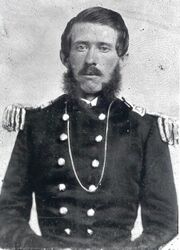Nomination Background[]

Early photograph of John I, King of the Union of Royal American States (1849)
In 1845, the URAS had been rocked to its foundations with the death of its founder and first king, Andrew I. His stepson, John I, was now the ruling monarch, and had been for the last three years. John was known to be more radical than his father, and much less statesman like. This would be John's first appointment of a Prime Minister, and greatly show what kind of a reign he would have.
The Crown Party, after its close defeat in 1844, had nominated Illinoisa Congressman Stephen A. Douglas. Many saw this as a shocking choice, since Douglas had only just been elected to Congress in 1844, and he was only be 35 years old if he took office. Despite this, Douglas had immediately become the leader of the expantionist wing of the Crown Party, and his speeches had rocked the Whig majority Congress. And Douglas was a westener, which was a key region to gain support. Nicknamed the "Little Giant" both for his size and age, he was considered a great candidate to energize Crown support. Along with these strong credentials, Douglas was also known as a bipartisan compromiser and a firm constitutionalist.
Candidates[]
With the Whigs already having a Prime Minister in office, it was generally accepted that there was only one choice:
- Prime Minister James Buchanan (57) of Pennsylvania
James Buchanan had narrowly been selected as Prime Minister in 1844, the last Prime Minister appointment of Andrew I's life. Immediately after coming into office, Buchanan and the Whigs had lost valuable support with their opposition to entering the Peruvian War, and the division of Peru afterwords. They preferred neutrality, but since Andrew had sent an army to South America to fight without a declaration of war, there was nothing Buchanan could do to stop him. This angered him to no end, wishing there was a stronger constitutional limit on the King. After Andrew died, he considered asking for a bill that would require a declaration of war before using the armed forces against a foreign nation, but Whig insiders assured him this was political suicide, and so he kept the idea to himself. In 1846, when the Tariff of 1826 came up to vote for renewel, it was successfully passed by a Whig Congress and signed into law by Buchanan. The new tariff would once again come up for a vote in twenty years. This happened with very little fuss, since everyone saw it coming since 1844. Everything else carried on as normal, while dealing with a new monarch. But what really stung was the Whig's opposition to the Peruvian War. This angered many people who supported the war, and were in favor of URAS expansion; most historians cite this as a direct reason Douglas proved so popular among people. Buchanan of course announced he would seek a second term, and despite some reservations by Whigs who saw the threat Douglas gave, no one announced their opposition.
Nominating Convention[]
The Whig nominating convention took place in the capital of Philadelphia. Few attended, already expecting the outcome. After a few nominating speeches and advocating the same general platform, James Buchanan was nominated by acclamation, along with Viceroy Abel P. Upshur.
Results[]

Congressman Stephen A. Douglas of Illinoisa, Crown Nominee for Prime Minister in 1848
Like he did in 1844, Buchanan staged a front-porch campaign, relying on local Whig structures and the quiet dominence of incumbency. But his opponent, Douglas, took to the stump, giving speeches all over the country, similar to Hunter DeRensis' campaign of 1816. But in a major step, Viceroy Abel P. Upshur also went campaigning. Uphsur made speeches and appearences in Delaware, Maryland, and his home state of Virginia. Without a southern nominee, Upshur was sure that the Whigs could make traction in the upper south.
Douglas seeminly guaranteed the Crown Party all of the west and far north. New England remained staunchly for Buchanan, and continued to donate generously to his campaign. Amazingly, it was the usually solid Crown south that would be the decider. Most southerns liked Douglas, although they also liked the much more experienced Upshur, who promised Buchanan would work for southern interests in a second term. With his constant campaigning on his native soil, Upshur was able to sway many upper southerners away from Douglas, and historians agree that this saved the Buchanan campaign.
When it came time for John I to decide, Buchanan and Douglas were neck and neck in the polls. Buchanan and Douglas were both tied around 48% support. Many observers said this basically guaranteed Douglas the appointment, since John I was a Crown supporter himself, and had a distaste for Buchanan. But amazingly, John I settled on James Buchanan against all odds. Some contended that although Douglas was popular and an expantionist, he was also a firm constitutionalist, arguably more than Buchanan himself; Douglas actually believed firmly in the will of the people. This would not do for John at all, and so with that he swallowed his pride and chose Buchanan for a second term.